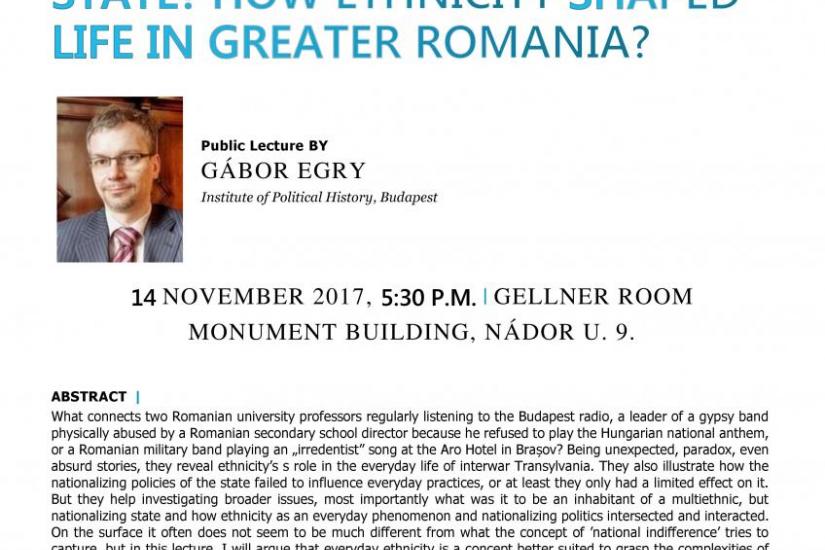
INSIGNIFICANT MOMENTS WITHIN A NATIONALIZING STATE? HOW ETHNICITY SHAPED LIFE IN GREATER ROMANIA?
Public Lecture BY
GÁBOR EGRY
Institute of Political History, Budapest
14 NOVEMBER 2017, 5:30 P.M. |MONUMENT BUILDING GELLNER
ABSTRACT |
What connects two Romanian university professors regularly listening to the Budapest radio, a leader of a gypsy band physically abused by a Romanian secondary school director because he refused to play the Hungarian national anthem, or a Romanian military band playing an „irredentist" song at the Aro Hotel in Brașov? Being unexpected, paradox, even absurd stories, they reveal ethnicity's s role in the everyday life of interwar Transylvania. They also illustrate how the nationalizing policies of the state failed to influence everyday practices, or at least they only had a limited effect on it. But they help investigating broader issues, most importantly what was it to be an inhabitant of a multiethnic, but nationalizing state and how ethnicity as an everyday phenomenon and nationalizing politics intersected and interacted. On the surface it often does not seem to be much different from what the concept of 'national indifference' tries to capture, but in this lecture, I will argue that everyday ethnicity is a concept better suited to grasp the complexities of how ethnicity shaped different spheres of life. It does not make 'national indifference', however, dispensable or obsolete as there is a possibility to integrate it into the theoretical framework as one variety of everyday ethnicity.
BIO |
Gábor Egry is a historian, PhD, director-general of the Institute of Political History, Budapest. His research focuses on nationalism, everyday ethnicity, regionalism, politics of identity and memory in modern Eastern Europe. He was visiting fellow at New Europe College – IAS, Bucharest; Imre Kertész Kolleg, Jena; Stanford University Center for Russian East European and Eurasian Studies. His latest book 'Etnicitás, identitás, politika. Magyar kisebbségek nacionalizmus és regionalizmus között Romániban és Csehszlovákiában 1918-1944' (Ethnicty, identity, poitics. Hunagrian minorities between nationalism and regionalism in Romania and Czechoslovakia 1918-1944) analyzed politics of identity and everyday ethnicity in interwar Czechoslovakia, Romania and Hungary, and was shortlisted for the Felczak-Wereszycki Prize of the Polish Historical Association in 2017. Currently, he leads the research project „Negotiating post-imperial transitions 1918-1925. A comparative study of local transitions from Austria-Hungary to the successor states", funded by the Hungarian National Research Fund.